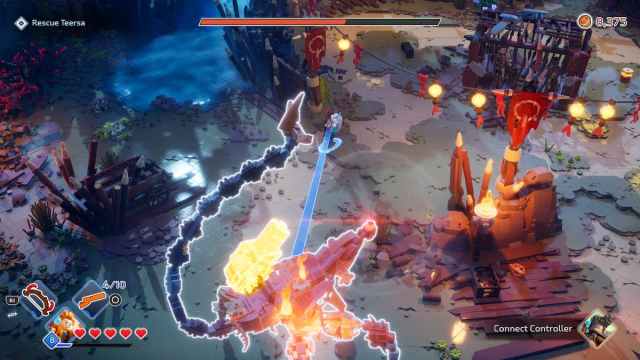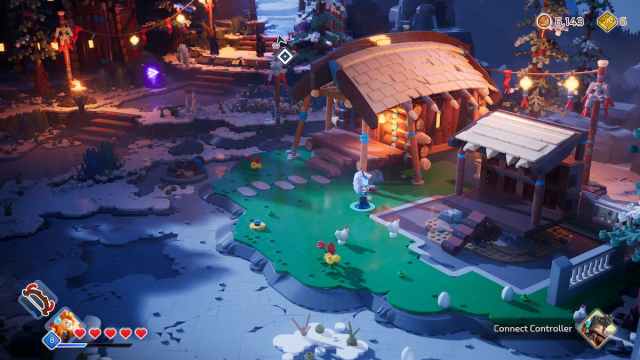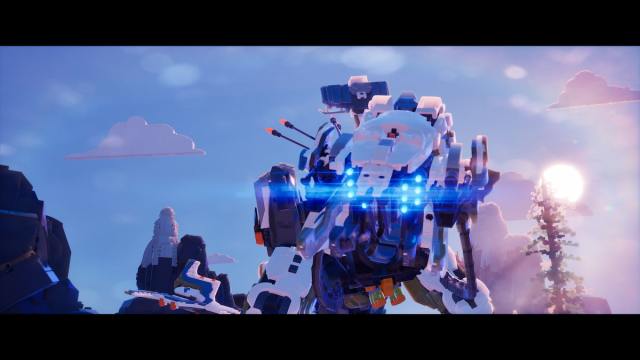Lego has really become a staple in the video game world over the years, taking over popular worlds and adding the more casual and silly Lego charm. Last year, the Lego universe expanded a bit more outside of the box with cart-racer Lego 2K Drive and the open-world survival Minecraft-like Lego Fortnite. But the next chapter in the Lego universe, Lego Horizon Adventures, is a bit outside the normal Lego formula.
While previous action-adventure Lego games have taken place inside the worlds of legendary movie franchises (Star Wars, Marvel, Jurassic World, Lord of the Rings, Harry Potter, etc.) Lego Horizon Adventures is unique in that it serves as an abridged reinterpretation of the original Horizon Zero Dawn.
My biggest concern going into Lego Horizon Adventures was that I wasn’t sure how well the world of Horizon would translate into a Lego game. As great of a game Horizon Zero Dawn is, it’s mainly because of its incredible story, vast beautiful open world, and fast-paced and challenging gameplay. All of these are things that Lego games typically strip out when converting to the Lego universe.

Lego Horizon Adventures (PC, PS5 [Reviewed], Switch)
Developer: Guerilla Games and Studio Gobo
Publisher: PlayStation Studios and Sony Interactive Entertainment
Released: November 14th, 2024
MSRP: $59.99
Lego Horizon Adventures starts off just like Zero Dawn. For those not familiar with Horizon, the world is a post-apocalyptic United States 1,000 years in the future. Humanity has been scattered and forced to form primitive tribes that try to integrate the technology of the “Old World” into their everyday life. In terms of story, I can’t stress enough how much of the story of Horizon Zero Dawn is omitted, trivialized, or simply not explained in Lego Horizon Adventures. I know that’s common for the Lego games, but I just want to point out that if you haven’t played the original and are interested in doing so at some point, I’d recommend doing so before jumping into the Lego world of Horizon.
Instead of roaming around exploring the mysterious world, you’ll play through mostly linear levels split into different areas. Between each level, you’ll return to your tribal village where you can interact with NPCs at the village—though there’s not much reason to do so—as well as rebuild the village how you want. Then, head to the entrance into the area of the level you want to embark on and repeat the process. Each of the levels in a specified zone is similar in design and layout, but not completely identical. There are a few side paths you can go down to open a chest full of studs but for the most part, the levels are completely linear and very quick, with each one only taking a few minutes to complete.
When I first discovered the village building feature, I had hoped it would be meaningful and unlock new interactions or even more systems to explore. Instead, it’s mostly just cosmetic fluff that allows you to choose from a variety of prebuilt structures with different coats of paint—mostly themes from other Lego franchises like Lego City and Lego Ninjago—to throw down in your village as you complete a certain number of missions. It’s essentially a moneysink—err, studsink—for spending your currency earned by playing through the levels, but for the most part, everything is just decoration.

Embarking on a mission will take you on a linear journey through the area, progressing a part of the story as you run through the level doing some light platforming, collecting studs, and fighting off various enemies that spawn throughout the level including humanoid cultists and staple animal-like machines that Horizon is known for. The machines have unique weak points similar to their counterparts in Horizon Zero Dawn. When targeted, you’ll inflict massive damage to the machines, allowing you to take them down much quicker.
The gameplay itself is about what I expected from a Lego version of Horizon. You hold square to nock back an arrow then fire it in any direction, aiming with your thumbstick. As you kill enemies they can drop various powerups such as a version of your bow that catches your enemy on fire on hit. There are three element types: fire, ice, and lightning. Some enemies are weak to certain element types, but even if they aren’t they can still often be taken down in a few hits with your bow. Hitting them with the element they are weak to will often just cut that down to one or two hits.
There are also utility items you can pick up to further expand your arsenal. There are a wide variety of items—often silly ones—that allow to engage in combat in a variety of ways. One such item acted as a massive hammer that allowed you to slam into your enemies. Another had you quickly build a, uh, hot dog stand, where the vendor threw explosive hot dogs at nearby enemies. Yep, hot dog bombs.
I’d describe the combat in Lego Horizon Adventures as better than most of the Lego games, but overall still a bit lacking. My biggest gripe with the combat is there is no evade or dodge roll type of mechanic, which I feel would really add to the combat here. A lot of the enemies do telegraphed attacks that show up as a big AoE circle or a line that you have to get out of the way of before the enemy charges at you. But without any sort of dodge action, you must stop attacking and then just run out of the way. It slows down the combat and at many times I still found myself hitting a button to try and dodge out of the way just because it really feels like you’re supposed to be able to.

I think my biggest issue with Lego Horizon Adventures is that I don’t really know who it was made for. Even though it’s an abridged reinterpretation of the Zero Dawn story, far too much has been omitted, watered down, or even just downright skipped or not explained to make the story anywhere near as coherent or meaningful. If you haven’t played Horizon Zero Dawn, this certainly isn’t just an alternative replacement to the experience. There’s too much missing, and everything that makes Horizon Zero Dawn the great game that it is is simply not there in its Lego rendition.
And on the flip side, if you have played through and enjoyed the original game, what reason is there to experience the watered-down Lego version? For most Lego games, the entire storylines for the games (once again, Star Wars, Harry Potter, Jurassic World, etc) simply don’t have playable media in which you can explore their worlds. Joining the Lego games universe allows you to actually play in those worlds for the first time whereas otherwise they can only be explored through their movies. That’s not the case here; if you want to play in the Horizon universe, you can play Horizon Zero Dawn or even Horizon Forbidden West.
To be clear, there’s certainly an audience for Lego Horizon Adventures. If you’re a big fan of the Lego game formula and either love Horizon Zero Dawn or have no interest in ever playing through it, there’s some fun to be had blasting through the game, especially if you have someone to co-op it with. But for me, I quickly found the entire experience very repetitive and not a true representation of what makes Horizon special. Look, I’m a Lego fan. But this time around, I feel it really doesn’t do the source material justice.
[This review is based on a retail build of the game provided by the publisher.]





